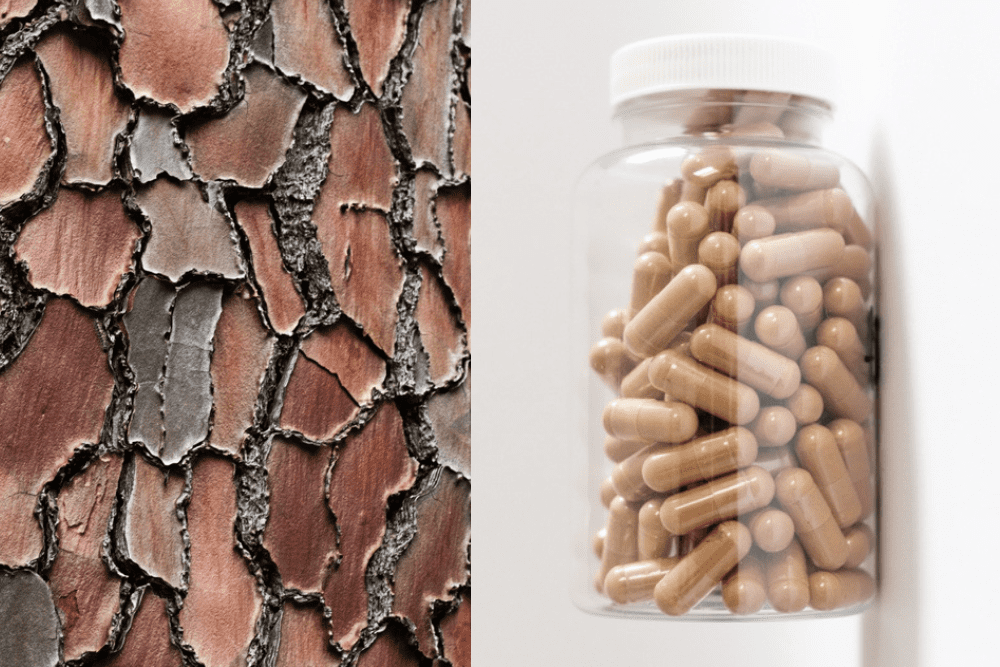On a crisp autumn afternoon, the forests of Les Landes de Gascogne in southwest France stand tranquil. Among these trees grows the French maritime pine (Pinus pinaster), the source of pine bark extract.
In the world of supplements, pine bark extract has carved a niche.
But beyond the marketing, how much of its reputation holds under scrutiny? As more people turn to natural remedies, is pine bark extract a meaningful addition to health routines, or merely another overhyped supplement?
Pycnogenol® and Its Origins in Pine Bark Extract
Pycnogenol® is the trademarked name for a standardised form of pine bark extract derived from the French maritime pine. This supplement is promoted as having antioxidant and anti-inflammatory properties.

Pycnogenol® is trademarked by Horphag Research, a company specialising in the development and distribution of natural health products. The company supplies Pycnogenol® as a raw material to various manufacturers, who then produce a range of products containing the extract.
Health Claims and the Evidence Behind Pine Bark Extract
Pine bark extract is often marketed as a natural solution for a wide range of health concerns. Proponents point to its antioxidant and anti-inflammatory properties, suggesting it can improve cardiovascular health, alleviate symptoms of chronic conditions, and even support cognitive function and skin health.
Studies have explored these claims with varying degrees of success. Not all findings are consistent. Some studies report significant benefits, while others show limited or no measurable improvements in blood pressure or cholesterol levels.
In chronic conditions such as diabetes and osteoarthritis, pine bark extract shows promise in managing symptoms and improving quality of life. A 2019 review highlighted its potential to improve endothelial function, reduce joint pain, and alleviate inflammation.
These findings are encouraging, yet many studies remain small-scale or focus on short-term outcomes. More research is needed to fully understand its long-term effects.
Nature’s Farm and Pycnogenol®
Nature’s Farm markets its Pycnogenol® supplement as a premium product, highlighting a range of potential benefits. The company lists improvements in blood circulation and heart health, a potential reduction in joint pain, and a backing of 160 clinical trials and 450 scientific publications.

The supplement’s 100-milligram dosage offers flexibility, as the recommended usage suggests one to two tablets daily after meals. For those considering long-term supplementation, Nature’s Farm’s product offers a convenient way to incorporate Pycnogenol® into a daily routine.
Evaluating the Role of Pine Bark Extract in Wellness
Pine bark extract, particularly in its trademarked form as Pycnogenol®, has gained popularity for its purported ability to address a wide range of health concerns.
While early research are promising, most studies are small or short-term, leaving open questions about the long-term safety and efficacy of the supplement.
For those considering pine bark extract as part of a health regimen, consult with a healthcare professional. A doctor or dietitian helps determine if the supplement suits individual needs and advises on interactions with medications or treatments.
The Broader Context of Supplements
The popularity of pine bark extract and supplements like Pycnogenol® reflects the growing demand for natural health products. However, the dietary supplement market is less regulated than the pharmaceutical industry.
In many regions, manufacturers are not required to prove the efficacy of their products before selling them. This can lead to varying quality and reliability of claims.
Consumers may find it challenging to distinguish between genuine benefits and marketing language. Therefore, it is important for consumers to assess the evidence behind each product carefully, especially in the context of their own health.
Researching the product, consulting healthcare professionals, and evaluating personal health needs can help ensure informed decisions. Supplements can be a beneficial addition to a wellness routine, serving to support professional medical advice and treatment.

